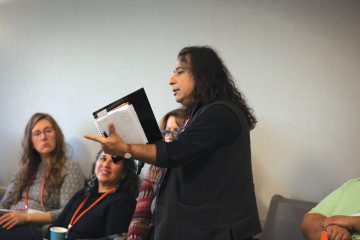Story
Positive Direction
Dipankar Mukherjee (BF’05) leads Pangea World Theater with a message of peace and inclusion
DATE
June 26, 2020

By Sheila Regan
When he applied for the 2005 Bush Fellowship, Dipankar Mukherjee had the audacious idea to research peace.
“I remember when I first presented, the whole room burst out laughing,” Mukherjee recalls. “I said, ‘Isn’t it interesting that if I had said I wanted to research war or violence, I would have had a less cynical response.’”
As a theater director, Mukherjee has always found himself drawn to the question of peace. As a teenager directing street theater in India, he was introduced to the writings of anti-apartheid playwright Athol Fugard and found a parallel between the struggle in South Africa and the stories he was bringing to life about caste systems and colonialism.
Mukherjee would eventually study with Fugard and assist him in directing his work in North America. In the early 1990s, Mukherjee came to Minnesota to be a resident director at the Guthrie Theatre in Minneapolis. He and his wife, Meena Natarajan, went on to found Pangea World Theater in 1995.
“I think he is a brilliant artist and director,” says Sharon Day, an Ojibwe activist and artist who is on the Pangea board of directors. “If you are going to see a play he has directed, it is going to be seething.”
Day credits Pangea for its long tradition of supporting Indigenous artists, as well as forging alliances between local theaters of color and Native theater in the Twin Cities. “What better way to work toward social justice than for people around the world to tell their own stories?” Day says.
For his Bush Fellowship, Mukherjee spent 26 months traveling to South Africa to work with the Truth and Reconciliation Commission, a restorative justice assembly created in the wake of apartheid. He also made multiple visits to India, where he met with peace activists, artists, poets, writers and teachers doing work in reaction to incidences of religious violence.
The Fellowship created a shift for Mukherjee personally as well as for others at Pangea. “We are not the same human beings,” Mukherjee says.
Today, each staff meeting begins with a ritual, in part as an attempt to decolonize their space. “We always sit around the fire,” Mukherjee says, gesturing to a small table covered in a red tablecloth, with a lamp and a bell in the center. “It’s our method of ritualizing our life and ritualizing our work.”
As Pangea marks its 25-year anniversary, Mukherjee continues to seek connections with communities of color, Indigenous populations and LGBTQ communities in the Twin Cities. Pangea has held programs such as the Indigenous Voices series, the Directing Institute for artists of color, queer artists and women directors, and the Alternate Visions program, which supports artists of color, immigrant and Indigenous writers developing their work and craft.
Pangea has also opened their space in a critical time, when other venues that have been accessible to historically marginalized communities have shuttered. And the organization has extended its work throughout the surrounding neighborhood in south Minneapolis, bringing art and performance to the community through their Lake Street Arts program.
This work is an extension of Mukherjee’s intersectional approach to art that is intricately linked to social justice, equity and spirituality. It’s a practice that starts with an inner awareness, continues with building trust in relationships and dares to imagine that a better world is possible.
Continue reading
-

Story
Initiating changemakers
How the Initiators Fellowship supports business enterprises that prioritize social and environmental good throughout Greater Minnesota.
-

Note from Jen
Note from Jen: Acknowledging and learning from the boarding school era
The Bush Foundation was invited to the gathering at Gila River...
-

News
Meet the 2024 Bush Prize winners!
Bush Prize winners are doing big things in partnership with their communities.